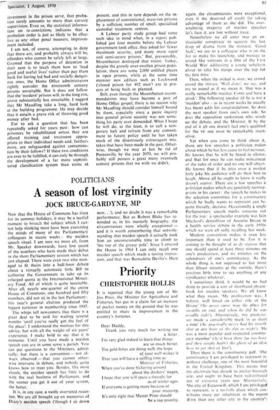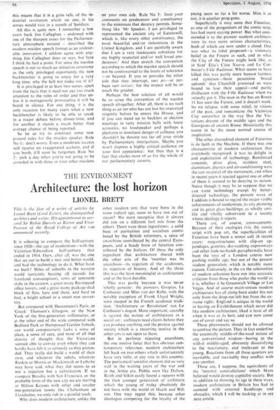POLITICIANS
A season of lost virginity
JOCK BRUCE-GARDYNE, MP
Now that the House of Commons has risen for its summer holidays, it may be a tactful moment to broach the subject which I can- not help thinking must have been exercising the minds of many of my Parliamentary colleagues in recent weeks : the maiden speech ritual. I am sure we must all, from Mr. Speaker downwards, have lost count of the numbers who haVe made their debut in the short Parliamentary session which has just elapsed. There were even two who man- aged to fit theirs into a half-hour debate about a virtually automatic little Bill to authorise the Government to take up its enlarged quota at the International Monet- ary Fund. All of which is quite inevitable. After all, nearly one-quarter of the entire House of Commons, one hundred and fifty members, did not sit in the last Parliament: this year's general election produced the biggest turnover in membership since 1945.
The whips tell newcomers that there is a great deal to be said for waiting several months 'until you've really got the feel of the place'. I understand the motives for this advice, but with all the weight-of six years' experience, I make bold to say that it is nonsense. Until you have made a maiden speech you are in some sense a pariah. You can put questions to the Ministers, admit- tedly: but there is a convention — not al- ways observed — that 'you cannot other- wise intervene in debate, and nobody quite knows how to treat you. Besides, like most rituals, the maiden speech has little to do with the real business of Parliament, and the sooner you get it out of your system, the better.
It is, in any case, a vastly overrated occas- ion. We are all brought up on memories of Dizzy's maiden speech ('though I sit down now...'), and no doubt it was a remarkable performance. But as Robert Blake has re- minded us in his masterly biography, the circumstances were wholly exceptional and it is worth remembering that notwith- standing that maiden speech it actually took him an unconscionable time to climb to 'the top of the greasy pole'. Since I entered the House in 1964 I can only recall one maiden speech which made a lasting impres- sion. and that was Bernadette Devlin's. Here again, the circumstances were exceptional, even if she deserved all credit for taking advantage of them as she did. The over- whelming majority of maiden speeches let's face it, are lost without trace.
Nonetheless we all enter into an en- thusiastic conspiracy to squeeze the last drop of drama from the moment. 'Good
luck', we say to a colleague who is on the list to make his launching, and manage to
sound like veterans in a film of the First World War addressing a young subaltern about to take his troops over the top for the first time.
Then, when the ordeal is over, we crowd
round the initiate. 'Well done', we say, and try to sound as if we mean it, 'that was a
really remarkable maiden. Come and have a drink'. The following speaker (if he is not a 'maiden' also - as in recent weeks he usually has been) adds his congratulations. So does
the next speaker from one's own side. So does the opposition spokesman who winds up the debate, and the Minister. If by the end of it all one doesn't feel one's qualified for the vc one must be remarkably insen-
sitive.
Yet when you come to think about it, there are few speeches a politician makes about which he has less cause to feel nervous. He knows that he will be heard in silence, and that for once he can make mincemeat of the rules of order and no one will object. He knows that if he tries even a modest little joke his audience will do their best to laugh. Above all he ought to know it really doesn't matter. There are a few speeches a politician makes which are genuinely turning- points in his career: the speech he makes to the selection committee for a constituency which he badly wants to represent can be. quite literally, decisive. Occasionally a single Parliamentary speech marks someone out for the top: a spectacular example was lain Macleod's demolition of Aneurin Bevan in a health service debate in the early 1950s which we were all sadly recalling last week.
Modern convention makes it even less important than it used to be. For it is coming to be thought of as de rigueur that one should spend at least three minutes on one's predecessor, and six minutes on the splendours of one's constituency. As the whole thing is not supposed to last more than fifteen minutes at the outside, there's precious little time to say anything of any significance whatever.
I sometimes think it would be no bad thing to provide a sort of shorthand phrase- book for maiden speakers. We all know what they mean. 'My predecessor was. I believe, well loved on either side of the House' ('he never came near the place for months on end, and when lie did he war usually tight). Alternatively, 'my predeces- sor made a considerable mark in so short a time' ('he practically never had his mouth shut at any hour of the day or night). 'He was a most popular and respected constitu- ency member' ('he'd been there far too long and they simply hadn't the ghost of an idea how to get shot of him).
Then there is the constituency guff. 'The constituency I am privileged to represent is. without challenge, one of the most beautiful in the United Kingdom.' This means that my electorate has shrunk to pocket-borough size, and ought to have been redistributed out of existence years ago. Alternatively. 'the city of Eatanswill. which I am privileged to represent, is a no-frills place which con- tributes more per inhabitant to the export drive than any other city in the country':
this means that it is a grim relic of the in- dustrial revolution which no one in his senses would visit in a month of Sundays.
All this is quite new. I remember a few years back Jim Callaghan – endowed with one of the sharpest noses for the Parliamen- tary atmosphere around – described the modern maiden speech format as an undesir. able innovation. 1 seldom agree with any- thing Jim Callaghan does or says, but here I think he had a point. For since the maiden speech is not so much an initiation ceremony as the only privileged opportunity the new backbencher is going to enjoy for a very long time, why the hell not make use of it?
It is privileged in at least two senses, apart from the facts that it need not pay too much attention to the rules of order and that un- less it is outrageously provocative it will be heard in silence. For one thing, it is the only occasion for many years when a new backbencher is likely to be able to speak in a major debate before dinner-time; and for another it stands a much better than average chance of being reported.
So let us try to construct some new ground rules for the maiden speaker. Rule No 1: don't worry. Even a moderate success will receive an exaggerated acclaim, and if you boob, it'll soon be forgotten. Rule No 2: pick a day when you're not going to be crowded in with three or four other maidens
on your own side. Rule No 3: limit your comments on predecessor and constituency to the minimum that decency permits. Some- thing like `Mr Speaker, 1 am privileged to represented the ancient city of Eatanswill, which is, like every other constituency, the most beautiful and/or industrious in the United Kingdom, and I am painfully aware that I am a very inadequate substitute for my highly respected and/or well loved pre- decessor.' And then stretch the convention according to which the maiden speech should not be controversial to the limits of tolerance —or beyond. If you so provoke the other side that they interrupt, rant pis—or per- haps tart ,nieux: for the impact will be so much the greater.
Perhaps the best solution of all would be to scrap the convention of the maiden speech altogether. After all, there is no such thing as an MP who has not lost his oratorical virginity before he enters the House, and if you can stand up to hecklers at election meetings in tatty mission halls with lousy acoustics, no loudspeaker and perhaps a platform in imminent danger of collapse, you shouldn't be thrown too far off your stride by Parliamentary interjections. Maybe you won't impress a highly critical audience on your first appearance: but then that is a feat that eludes most of us for the whole of our parliamentary careers.































 Previous page
Previous page